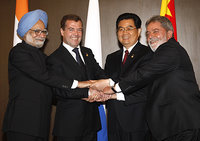South Africa will formally join the BRIC grouping of Brazil, Russia, India and China at their April 14 summit in Hainan, China. Echoing previous meetings, the major focus of the summit will be to consolidate the impression that the BRICs are the rising force in the global arena. The June 2009 Yekaterinburg summit was hailed as an "historic event" by Russian President Dmitry Medvedev and was punctuated by a call for "the emerging and developing economies [to] have a greater voice and representation in international financial institutions" (.pdf). Then-Brazilian President Lula da Silva, host of the April 2010 summit, upped the ante by declaring that "a new global economic geography has been born." How does the addition of South Africa fit with this grand vision?
It is hard to make a convincing argument for South Africa's inclusion in the BRICs purely based on economic weight. Goldman Sachs invented the concept of BRICs in 2003 largely on the basis of the four countries' structural importance to the global economy: All four are objectively big -- in terms of population, markets, proportion of global GDP and trade, and investment opportunities. They also all enjoy rapid rates of economic growth. By any of these criteria South Africa is not in the same league. Underscoring this point, Goldman Sachs did not even include South Africa in its alternative category of rising countries, the "Next 11" (.pdf).
The argument for South Africa's entry is largely based on diplomatic logic. South Africa has worked well with other BRIC members in a number of coalitions. This process started with the so-called Heiligendamm Process in terms of "outreach" with the G-7 and G-8 from the time of the 2005 Gleneagles summit. This comfort level is evident as well in the formation of the BASIC group -- Brazil, India and China along with South Africa -- in relation to climate change negotiations.

